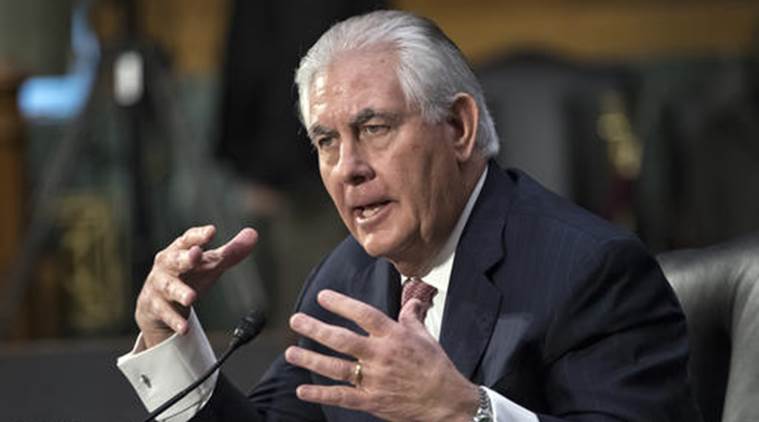Next Stop Beijing: Tillerson to Press China on North Korea

EghtesadOnline: For Secretary of State Rex Tillerson, the easier part of his Asia trip is over. After checking in with allies Japan and South Korea he heads Saturday to China, a country President Donald Trump blasted again on Friday for not doing enough to rein in North Korea.
“North Korea is behaving very badly,” the U.S. president wrote in a Twitter posting.“They have been ‘playing’ the United States for years. China has done little to help!”
According to Bloomberg, the U.S. is hoping the urgency of North Korea’s advancing ballistic-missile technology will compel China to crack down on banks and other businesses that provide an economic lifeline to Kim Jong Un’s regime despite United Nations sanctions. China has favored a softer touch, fearing an economic collapse in North Korea would spur a refugee crisis and put a U.S ally on its border.
In meetings with senior Chinese officials across the weekend, Tillerson is likely to suggest time is running out for a response as Pyongyang’s capabilities grow.
Speaking in Seoul on Friday, he said 20 years of U.S. policy toward North Korea had failed, detailing an approach focused on tougher sanctions enforcement and cutting off other revenue sources. He suggested the U.S. would consider a preemptive strike if the threat posed by Pyongyang’s missile program grows too severe.
Still, a big complication is Chinese anger over South Korea’s plans to deploy a U.S. missile shield called Thaad on its soil. China says the system could be used against it, despite assurances it’s targeted at Kim. It has put limits on Chinese tourists to South Korea, while South Korean shops have had operations in China suspended for alleged fire safety breaches.
The U.S. refuses to withdraw Thaad, and that puts limits on what Tillerson can offer China in return for greater cooperation on North Korea. Trump’s administration has also rebuffed a Chinese proposal to suspend annual military drills with South Korea in exchange for a halt to Kim’s nuclear program.
“The first thing is they’ve got to get into a deep dive with the Chinese and try to have some understanding of what they’re dealing with and see if there can be some common ground,” said Christopher Hill, who led U.S. talks with North Korea under former President George W. Bush. “The U.S. needs to overcome what has become a mountain of mistrust with the Chinese.”
A White House review of North Korea policy is under way, and Tillerson is unlikely to announce a major breakthrough with China. In the meantime, Kim’s weapons program is advancing. Last year North Korea conducted two nuclear weapons tests and launched 24 ballistic missiles. A missile test in February was followed by four projectiles this month that landed inside Japan’s exclusive economic zone.
Speaking to reporters Friday, Tillerson said North Korea has nothing to fear from the U.S. or its allies, comments that appeared aimed partly at assuaging China, which has long held that North Korea pursued nuclear weapons out of fear that the U.S. wanted to topple the regime established by Kim’s grandfather after World War II.
At the same time, he said China was wrong to punish South Korea economically for deploying Thaad, calling it “inappropriate and troubling.”
“We ask China to refrain from such actions,” he said. “Instead we urge China to address the threat that makes Thaad necessary, that being the escalating threat from North Korea.”
In a rare briefing on Thursday, Pak Myong Ho, an official at North Korea’s embassy in Beijing, faulted the U.S. for turning down China’s proposal. He said North Korea needs its nuclear capability as a deterrent.
The impasse between the U.S. and North Korea -- the U.S. says Pyongyang must indicate a willingness to give up its nuclear ambitions before talks begin -- has long stymied progress on the issue.
Drop Preconditions
While some analysts have argued it’s time for the U.S. to drop any preconditions and get in the room with North Korea for talks, others say that would be counterproductive. One possibility may be to use back channels to let the sides state their views plainly without fear that public disclosure would force them back into their corners.
Massachusetts Senator Edward Markey, a Democrat on the Foreign Relations Committee, criticized Tillerson’s threats about preemptive force as counterproductive.
‘Coercive Diplomacy’
“Rather than making provocative threats and refusing to negotiate, the Trump administration should engage in coercive diplomacy aimed at halting and eventually rolling back North Korea’s nuclear and ballistic missile program,” Markey said in a statement Friday. “Only a combination of pressure and talks will address this grave threat to U.S. national security.”
Chinese officials will probably tell Tillerson the high-pressure approach won’t work, according to Ruan Zongze, vice president of the China Institute of International Studies run by China’s foreign ministry and an envoy to Washington from 2007 to 2011.
“It takes two to tango,” Ruan said. “For the U.S., the approach of no engagement and dialogue-with-preconditions has really reached its limitations. China will convey this message to Tillerson, along with its concern on Thaad."
At the same time, its not clear how far China’s leverage still goes. The North Korean regime is believed to have orchestrated the recent assassination of Kim Jong Nam, Kim’s half brother, at a Malaysian airport. He’d been regarded as being under Beijing’s protection, and after his murder China halted all coal shipments from the regime.
“Things have gotten so dangerous and we’re going to have to take some risks and China is going to have to take a risk if we’re going to sharpen the choice for North Korea,” said Wendy Sherman, North Korea policy coordinator during the presidency of Bill Clinton.
“When we have had enough conversations with China so that it enforces these sanctions and uses its economic leverage with North Korea to sharpen that choice, that’s when I think it would be time to say ‘Let’s talk.”’


